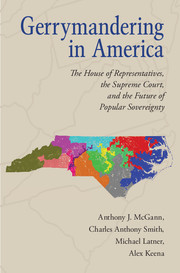 Gerrymandering in America
Gerrymandering in America Book contents
- Frontmatter
- Contents
- 1 The Unnoticed Revolution
- 2 The Jurisprudence of Districting
- 3 Measuring Partisan Bias
- 4 Geographic Explanations for Partisan Bias
- 5 Political Explanations of Partisan Bias
- 6 Constitutional Implications of Vieth: The Revenge of the Anti-Federalists
- 7 Answering Justice Scalia's Challenge to Equality: Does Equal
- 8 Conclusion: Vieth, Majority Rule, and One Person, One Vote
- Bibliography
- Index
6 - Constitutional Implications of Vieth: The Revenge of the Anti-Federalists
Published online by Cambridge University Press: 05 March 2016
- Frontmatter
- Contents
- 1 The Unnoticed Revolution
- 2 The Jurisprudence of Districting
- 3 Measuring Partisan Bias
- 4 Geographic Explanations for Partisan Bias
- 5 Political Explanations of Partisan Bias
- 6 Constitutional Implications of Vieth: The Revenge of the Anti-Federalists
- 7 Answering Justice Scalia's Challenge to Equality: Does Equal
- 8 Conclusion: Vieth, Majority Rule, and One Person, One Vote
- Bibliography
- Index
Summary
So far we have considered the partisan effects of the redistricting that followed the Vieth v. Jubelirer (2004) decision. However, these effects may be short term compared to the constitutional effects of the decision. The redistricting that followed the 2010 Census has indeed strongly advantaged the Republican Party, but after the 2020 Census, districts will need to be redrawn again. It is possible that the current biases will be erased. Indeed, it is even possible that they may be reversed if the Democrats are in a very strong position in state governments and choose to take full advantage of this. However, even if the current partisan advantage is not permanent, Vieth v. Jubelirer still represents a fundamental change in the effective constitution of the United States.
What the Vieth decision represents is a very clear increase in the power of state governments over national politics. There is now effectively no legal constraint on states employing partisan gerrymandering. We have demonstrated how powerful partisan gerrymandering can be when combined with modern computer mapping technology, even when the districts have to have equal populations. As a result, when one party controls state government, it can guarantee itself a majority on the state's congressional delegation. If this is the case, then it is the state government – and not the voters of the state – that determines the character of the state's congressional delegation. As we have seen, there are eighteen states with significant partisan bias after the 2010 redistricting. Of these, thirteen have an asymmetry of more than 20% and a partisan advantage of more than 10% given a 50/50 election. It is possible in one state (Pennsylvania) for the party that controlled the districting to win thirteen seats out of eighteen in spite of the other party winning a majority of the congressional vote. In these cases, only the strongest swing in support could overturn the bias. Whether this works to the benefit of the Democrats or Republicans in the future, the composition of Congress will be strongly influenced, if not determined, by races for the state legislature and the governor's mansion.
This represents a fundamental change to the Great Compromise that defined the U.S. system of government.
- Type
- Chapter
- Information
- Gerrymandering in AmericaThe House of Representatives, the Supreme Court, and the Future of Popular Sovereignty, pp. 177 - 195Publisher: Cambridge University PressPrint publication year: 2016


